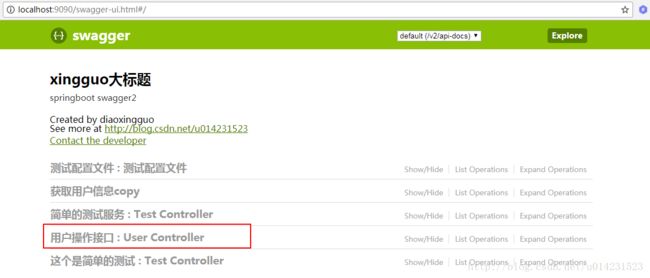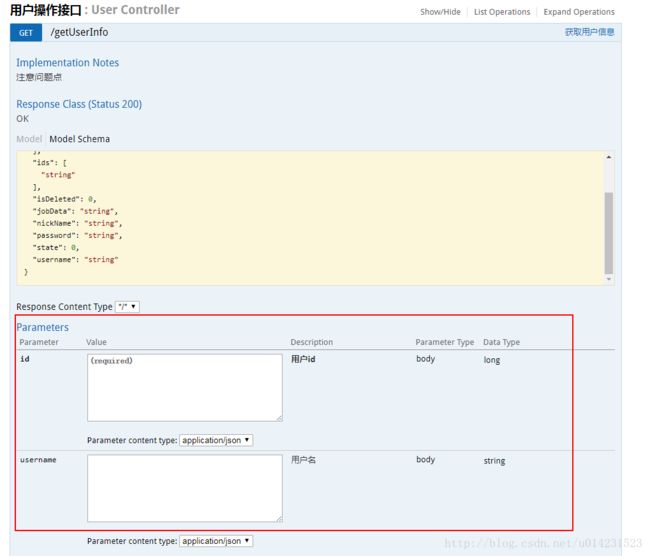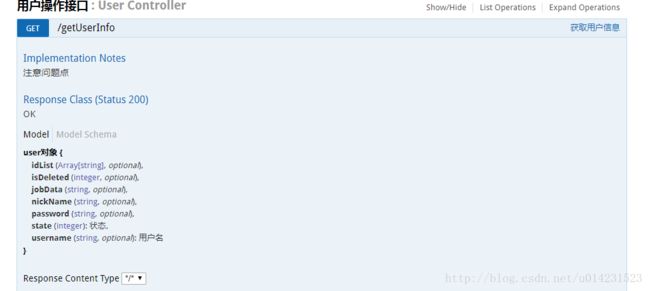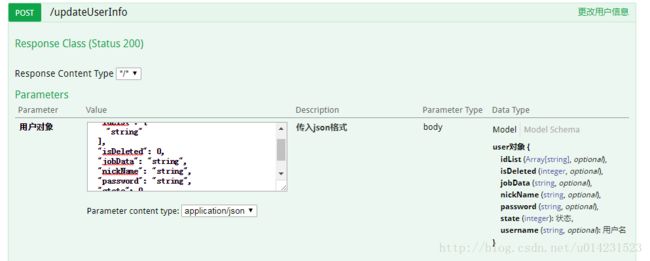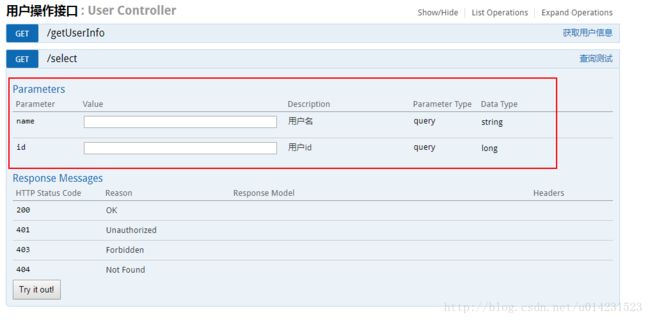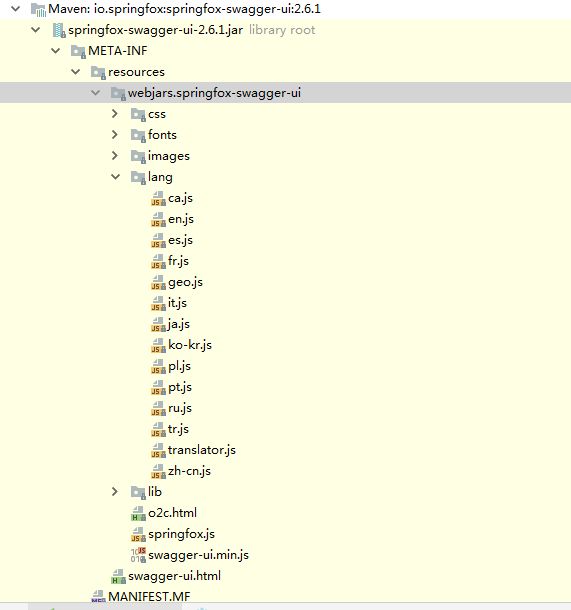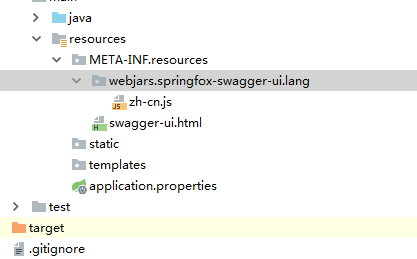我们仅仅需要2个jar包 就可以生成html ui界面
pom
io.springfox
springfox-swagger2
2.6.1
io.springfox
springfox-swagger-ui
2.6.1
添加一个配置类
@EnableSwagger2
@Configuration
public class SwaggerConfig {
@Bean
public Docket api(){
return new Docket(DocumentationType.SWAGGER_2)
.apiInfo(apiInfo())
.select()
.apis(RequestHandlerSelectors.basePackage("com.example.test.demo.web"))
.build();
}
public ApiInfo apiInfo(){
return new ApiInfoBuilder()
.title("api接口说明")
.version("1.0.0")
.build();
}
}
Controller
@Controller
@Api(value = "webcontroller")
public class WebController {
@ApiOperation(value = "获取信息",notes = "获取信息1",httpMethod = "GET")
@GetMapping("/get")
@ResponseBody
public Object get(){
Map map = new HashMap();
map.put("key1","nihao");
map.put("key2","nishi");
return map;
}
}
常用注解
@Api()用于类;
表示标识这个类是swagger的资源@ApiOperation()用于方法;
表示一个http请求的操作@ApiParam()用于方法,参数,字段说明;
表示对参数的添加元数据(说明或是否必填等)@ApiModel()用于类
表示对类进行说明,用于参数用实体类接收@ApiModelProperty()用于方法,字段
表示对model属性的说明或者数据操作更改@ApiIgnore()用于类,方法,方法参数
表示这个方法或者类被忽略@ApiImplicitParam() 用于方法
表示单独的请求参数@ApiImplicitParams() 用于方法,包含多个 @ApiImplicitParam
具体使用举例说明:
@Api()
用于类;表示标识这个类是swagger的资源
tags–表示说明
value–也是说明,可以使用tags替代
但是tags如果有多个值,会生成多个list
@Controller
@Api(value="用户controller",tags={"用户操作接口"})
public class WebController {
}
- @ApiOperation()用于方法;
表示一个http请求的操作
@ApiOperation(value = "获取信息",notes = "获取信息1",httpMethod = "GET")
@GetMapping("/get")
@ResponseBody
public Object get(){
Map map = new HashMap();
map.put("key1","nihao");
map.put("key2","nishi");
return map;
}
效果图
@ApiOperation() 用于方法;表示一个http请求的操作
value用于方法描述
notes用于提示内容
tags可以重新分组(视情况而用)
@ApiParam() 用于方法,参数,字段说明;表示对参数的添加元数据(说明或是否必填等)
name–参数名
value–参数说明
required–是否必填
@Api(value="用户controller",tags={"用户操作接口"})
@RestController
public class UserController {
@ApiOperation(value="获取用户信息",tags={"获取用户信息copy"},notes="注意问题点")
@GetMapping("/getUserInfo")
public User getUserInfo(@ApiParam(name="id",value="用户id",required=true) Long id,@ApiParam(name="username",value="用户名") String username) {
// userService可忽略,是业务逻辑
User user = userService.getUserInfo();
return user;
}
}
效果图
@ApiModel()用于类 ;表示对类进行说明,用于参数用实体类接收
value–表示对象名
description–描述
都可省略
@ApiModelProperty()用于方法,字段; 表示对model属性的说明或者数据操作更改
value–字段说明
name–重写属性名字
dataType–重写属性类型
required–是否必填
example–举例说明
hidden–隐藏
@ApiModel(value="user对象",description="用户对象user")
public class User implements Serializable{
private static final long serialVersionUID = 1L;
@ApiModelProperty(value="用户名",name="username",example="xingguo")
private String username;
@ApiModelProperty(value="状态",name="state",required=true)
private Integer state;
private String password;
private String nickName;
private Integer isDeleted;
@ApiModelProperty(value="id数组",hidden=true)
private String[] ids;
private List idList;
//省略get/set
}
@ApiOperation("更改用户信息")
@PostMapping("/updateUserInfo")
public int updateUserInfo(@RequestBody @ApiParam(name="用户对象",value="传入json格式",required=true) User user){
int num = userService.updateUserInfo(user);
return num;
}
效果图
@ApiIgnore()用于类或者方法上,可以不被swagger显示在页面上
比较简单, 这里不做举例
@ApiImplicitParam() 用于方法
表示单独的请求参数
@ApiImplicitParams() 用于方法,包含多个 @ApiImplicitParam
name–参数ming
value–参数说明
dataType–数据类型
paramType–参数类型
example–举例说明
@ApiOperation("查询测试")
@GetMapping("select")
//@ApiImplicitParam(name="name",value="用户名",dataType="String", paramType = "query")
@ApiImplicitParams({
@ApiImplicitParam(name="name",value="用户名",dataType="string", paramType = "query",example="xingguo"),
@ApiImplicitParam(name="id",value="用户id",dataType="long", paramType = "query")})
public void select(){
}
效果图
汉化
汉化,首先我们需要看一下依赖项目的jar,找到swagger-ui.jar
其实是swagger 会把ui里面的文件放到当前项目resource目录下,项目结构和上图的一样,我们需要在自己的项目中创建对应的文件夹以及文件去覆盖掉jar包里的文件,在自己的项目中添加文件夹
注意ui.html是在resources目录下
zh-cn.js
'use strict';
/* jshint quotmark: double */
window.SwaggerTranslator.learn({
"Warning: Deprecated":"警告:已过时",
"Implementation Notes":"实现备注",
"Response Class":"响应类",
"Status":"状态",
"Parameters":"参数",
"Parameter":"参数",
"Value":"值",
"Description":"描述",
"Parameter Type":"参数类型",
"Data Type":"数据类型",
"Response Messages":"响应消息",
"HTTP Status Code":"HTTP状态码",
"Reason":"原因",
"Response Model":"响应模型",
"Request URL":"请求URL",
"Response Body":"响应体",
"Response Code":"响应码",
"Response Headers":"响应头",
"Hide Response":"隐藏响应",
"Headers":"头",
"Try it out!":"试一下!",
"Show/Hide":"显示/隐藏",
"List Operations":"显示操作",
"Expand Operations":"展开操作",
"Raw":"原始",
"can't parse JSON. Raw result":"无法解析JSON. 原始结果",
"Example Value":"示例",
"Click to set as parameter value":"点击设置参数",
"Model Schema":"模型架构",
"Model":"模型",
"apply":"应用",
"Username":"用户名",
"Password":"密码",
"Terms of service":"服务条款",
"Created by":"创建者",
"See more at":"查看更多:",
"Contact the developer":"联系开发者",
"api version":"api版本",
"Response Content Type":"响应Content Type",
"Parameter content type:":"参数类型:",
"fetching resource":"正在获取资源",
"fetching resource list":"正在获取资源列表",
"Explore":"刷新",
"Show Swagger Petstore Example Apis":"显示 Swagger Petstore 示例 Apis",
"Can't read from server. It may not have the appropriate access-control-origin settings.":"无法从服务器读取。可能没有正确设置access-control-origin。",
"Please specify the protocol for":"请指定协议:",
"Can't read swagger JSON from":"无法读取swagger JSON于",
"Finished Loading Resource Information. Rendering Swagger UI":"已加载资源信息。正在渲染Swagger UI",
"Unable to read api":"无法读取api",
"from path":"从路径",
"server returned":"服务器返回"
});
swagger-ui.html
Swagger UI111
运行
http://localhost:8080/v2/api-docs/
http://localhost:8080/swagger-ui.html

